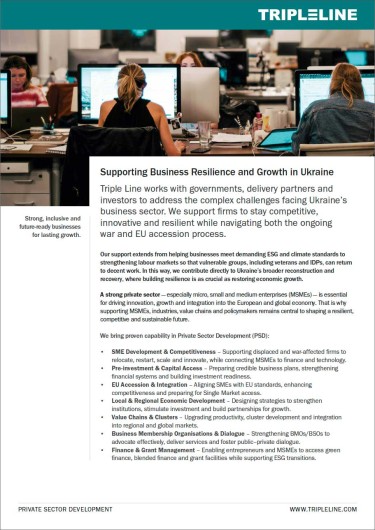Ukraine’s recovery depends on a strong, resilient private sector—a driving force for innovation, economic growth, job creation, and competitive integration into the European and global economy.
Beyond the immediate need to keep firms operating during the war, the longer-term challenge is enabling businesses, especially micro, small, and medium-sized enterprises (MSMEs), to drive this vision forward.
Recovery is not just about restarting economic activity—it is about reshaping markets, rebuilding trust, and creating opportunities for displaced people, veterans, and vulnerable groups to return to decent work. The private sector’s role in job creation, climate transition, and investment readiness makes it a cornerstone of Ukraine’s future prosperity.
The challenges ahead
Ukraine’s business environment is being tested on several fronts:
- War disruption and displacement – Firms must relocate, re-establish supply chains, and continue operating under uncertainty.
- EU accession – Aligning SMEs with EU standards, institutions, and practices will be a demanding but transformative process.
- Finance and investment – MSMEs need capital and financial systems that can channel funds towards innovation and growth.
- Labour market resilience – Ensuring that veterans, IDPs, and vulnerable groups are included in recovery efforts.
- Climate and ESG compliance – Embedding sustainability into business operations to meet both EU and global expectations.
These are not isolated issues. They interact and reinforce each other, meaning progress requires coordinated strategies that blend resilience with competitiveness.
Lessons from experience
In other post-conflict and transition contexts, several patterns stand out:
- Supporting SMEs to restart and scale – In South Sudan and Myanmar, targeted grants and technical assistance helped war-affected firms re-establish and find new markets. For Ukraine, displaced MSMEs will need tailored support to reconnect with their value chains and rebuild confidence.
- Building investment readiness – Across emerging markets, pre-investment support, including credible business plans, stronger financial systems, and robust governance, has been the difference between attracting capital and missing opportunities. For Ukraine, building investment readiness will be essential to long-term success.
- Sequencing EU accession reforms – Experience from the Western Balkans shows that the real test is not the agreements themselves, but rather the functioning systems. Helping firms comply with EU standards and compete in the Single Market will be absolutely essential.
- Strengthening institutions and dialogue – Recovery is more effective when business associations and chambers represent the interests of MSMEs and foster genuine public–private dialogue. Ukraine will need these voices to make reform stick.
- Regional and local development – From Ethiopia to Georgia, linking local strategies to national recovery has enabled displaced businesses and communities to restart, grow, and build confidence. Ukraine’s regional economies will also play a central role.
A partner for Ukraine’s business recovery
Triple Line has worked for over 25 years at the intersection of private sector development, competitiveness, and innovation. Our projects for the OECD, EC, UNDP, GIZ, and the World Bank span MSME development, value chain upgrading, public–private dialogue, and climate finance.
We bring this comparative insight to Ukraine not as a rigid model, but as flexible, practical tools to help governments, firms, and communities navigate recovery’s complexity. Ukraine’s reconstruction is more than rebuilding businesses — it is about shaping an economy that is resilient, inclusive, and globally competitive. That is the perspective we bring, and the partnership we offer.
For further information, please download our Ukraine Private Sector Development overview, or contact Ricardo Pinto.




